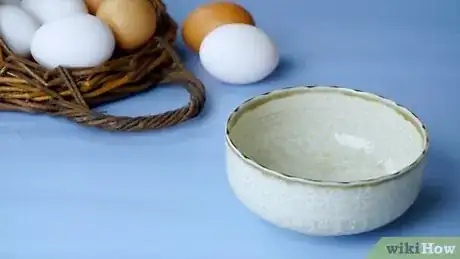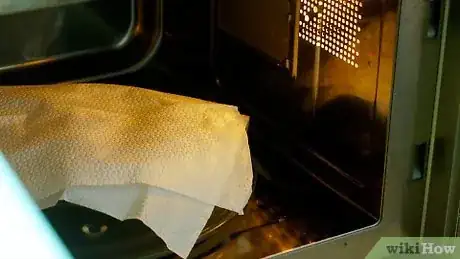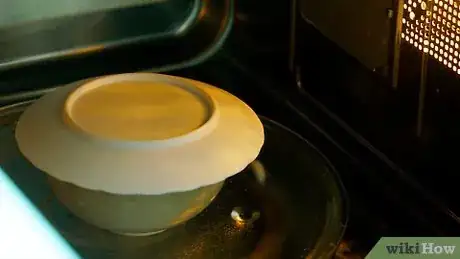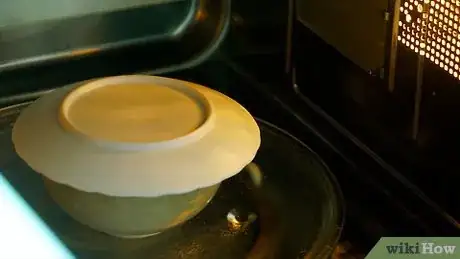This article was co-authored by wikiHow Staff. Our trained team of editors and researchers validate articles for accuracy and comprehensiveness. wikiHow's Content Management Team carefully monitors the work from our editorial staff to ensure that each article is backed by trusted research and meets our high quality standards.
The wikiHow Culinary Team also followed the article's instructions and verified that they work.
This article has been viewed 914,241 times.
Learn more...
Eggs are one of the simplest and most satisfying ingredients available. While eggs can be scrambled or poached fairly quickly on the stove, cooking an egg in the microwave is the fastest and easiest way. You can quickly learn how to microwave an egg by following a few simple steps.
Steps
Poached Egg
-
1Get a mug or small bowl. Any microwave-safe mug or bowl will work fine, but those with circular, flat bottoms work best. You'll end up with an egg in a convenient patty shape, perfect for serving on toast or an English muffin.
-
2Grease the bottom and sides. Dip a paper towel in a little bit of vegetable or olive oil and smear the oil around the inside of the bowl. You could also spray the mug or bowl with non-stick cooking spray. Melting butter into the bowl is another option.Advertisement
-
3Break the egg directly into the bowl. Be careful so you don't break the yolk.
-
4Add 1/3 cup of water. Just pour it right on top of the egg.
-
5Cover the bowl. Use a microwave-safe plate or paper towel. This will help prevent any splatters from dirtying your microwave oven.
-
6Cook the egg. Place it in the microwave and cook it on the highest power setting for 35 seconds. When it's done cooking, remove the paper towel and inspect the egg. If the white is still liquid, put it back in the microwave and cook for 10 or 15 seconds. Microwave wattages will vary, so adjust these cooking times as needed based on your microwave's power. When the white is no longer runny, it is done cooking.
- This cooking temperature results in a medium-cooked. If you want the yolk to stay runny, cook the egg at 50 percent power for about 60 seconds. Keep cooking until the white is set but the yolk is still runny.[1]
- For a hard-cooked egg (similar to a hard-boiled egg) cook on the highest power setting for 60 seconds.
-
7Remove the bowl from the microwave. Uncover the bowl and run a knife around the edge of the egg to loosen it. It should slide out easily onto your toast or a plate. Serve the egg as desired.
Scrambled Egg
-
1Get a mug or small bowl. Any microwave-safe mug or bowl will work fine.
-
2Grease the bottom and sides. Dip a paper towel in a little vegetable or olive oil and smear the oil around the inside of the bowl. You could also spray the mug or bowl with non-stick cooking spray. Melting butter into the bowl is another option.
-
3Break the egg directly into the bowl. Be careful so you don't break the yolk.
-
4Add a tablespoon of milk. You can use cream if you prefer creamier scrambled eggs.
-
5Whip it with a fork. Mix up the yolk, the white and the milk until the mixture is pale yellow and smooth.
-
6Cover the bowl. Use a microwave-safe plate or a paper towel.
-
7Microwave the egg. Place it in the microwave and cook it for 45 seconds, then remove it from the microwave.
-
8Stir and add toppings. Remove the cover and stir the mixture to fluff up the eggs. Add a tablespoon of shredded cheese, a small handful of scallions, or another topping if you'd like.
-
9Cook it for another 30 seconds. Check to see that the egg is set. If it still looks runny, give it another 15 seconds.[2]
-
10Scoop the egg onto a plate. Use a fork to fluff it up. Your scrambled egg is ready to eat.
Omelet
-
1Get a large microwave safe bowl. Choose one with a wide, flat bottom, since this will be the shape of your omelet. The larger the base, the wider and thinner your omelet will be.
-
2Grease the bottom and sides. Dip a paper towel in a little bit of vegetable or olive oil and smear the oil around the inside of the bowl. You could also spray the mug or bowl with non-stick cooking spray. Melting butter into the bowl is another option.
-
3Crack two eggs into the bowl. Use a fork to beat them until smooth.
-
4Add milk and seasonings. Pour in a tablespoon of milk, a pinch of salt and a shake of black pepper.
-
5Mix in your favorite fillings. Anything goes, as long as your fillings are chopped or shredded into small, bite-sized pieces. Try the following delicious fillings in your microwaved omelet:
- Shredded cheddar or swiss cheese
- Chopped onions
- Chopped peppers
- Chopped tomatoes
- Chopped spinach
- Chopped ham, bacon or sausage (precooked)
-
6Cover the bowl. Use a microwave safe plate or a paper towel.
-
7Microwave the omelet on high for 45 seconds. After it's finished cooking, check the omelet to see if it's set. If it still needs more time, microwave for another 30 seconds. Keep going until it's fully cooked.
-
8Slide it onto a plate. Use a spatula to help it out of the bowl if necessary.
Mini Quiche
-
1Get a large microwave safe mug. Choose one with a wide, flat bottom and tall sides.
-
2Grease the bottom and sides. Dip a paper towel in a little bit of vegetable or olive oil and smear the oil around the inside of the mug. You could also spray the mug with non-stick cooking spray. Melting butter into the mug is another option.
-
3Line the bottom of the mug with crushed butter crackers. These will form the quiche's "crust." Crush up the crackers and pour them into the bowl.
-
4Mix up the egg filling. In a separate bowl, beat together two eggs and a tablespoon of milk. Add a pinch of salt, a shake of pepper, and a handful of your favorite quiche fillings. Here are a few ideas:
- Chopped ham, bacon or sausage (precooked)
- Chunks of feta cheese
- Shredded gruyere cheese
- Chopped spinach
- Chopped tomatoes
-
5Pour the egg mixture into the mug. It will cover up the crackers and rise up the sides of the bowl.
-
6Cover the mug. Use a plate or a paper towel.
-
7Cook the quiche. Microwave it on high for 3 minutes. Check the quiche when it's finished cooking to make sure it's set.
-
8Eat the quiche straight from the mug. Scoop it out with the spoon and enjoy.[3]
Community Q&A
-
QuestionWhy is the quiche cooked in only 45 seconds to a minute and a half, but the mini quiche in a cup takes a full 3 minutes?
 Community AnswerThe thinner it is and over a wider area, the faster it cooks. Thinned out in a wide pan, it cooks fast, but narrowed down in a cup, it needs more cooking time.
Community AnswerThe thinner it is and over a wider area, the faster it cooks. Thinned out in a wide pan, it cooks fast, but narrowed down in a cup, it needs more cooking time. -
QuestionCan I make a sunny side up egg in the microwave?
 Community AnswerYes, you can. Use a saucer to crack the egg into and use a bowl to cover it, just in case it explodes. You might also want to break the yolk to prevent exploding, but it doesn't always work if you microwave it for too long. Start with maybe 15 seconds, depending on the wattage of your microwave. You can probably guess how much longer to cook it after that. Just make sure it is fully cooked before eating.
Community AnswerYes, you can. Use a saucer to crack the egg into and use a bowl to cover it, just in case it explodes. You might also want to break the yolk to prevent exploding, but it doesn't always work if you microwave it for too long. Start with maybe 15 seconds, depending on the wattage of your microwave. You can probably guess how much longer to cook it after that. Just make sure it is fully cooked before eating. -
QuestionCan I boil eggs in a microwave?
 Community AnswerPut the egg in a microwave-safe container with some water. Cook for about a minute -- the time depends on the type of boiled egg you prefer. See How to Hard Boil Eggs in a Microwave for more details.
Community AnswerPut the egg in a microwave-safe container with some water. Cook for about a minute -- the time depends on the type of boiled egg you prefer. See How to Hard Boil Eggs in a Microwave for more details.
Warnings
- Never microwave an egg in its shell. There is a very good chance the egg will explode in your microwave.⧼thumbs_response⧽
References
About This Article
To make a poached egg in the microwave, grease the sides and bottom of a small bowl or mug with olive oil or cooking spray. Then, break the egg into the bowl and add ⅓ cup of water to the bowl. Cover the bowl with a paper towel and cook the egg in the microwave for 35 seconds. If the egg is still runny, cook it for another 10-15 seconds. For tips on making scrambled eggs or an omelet in the microwave, read on!


























































